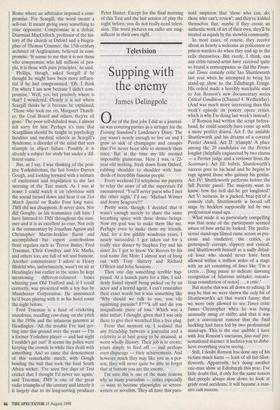Television
Supping with the enemy
James Delmgpole
One of the first jobs I did as a journal- ist was covering parties as a stringer for the Evening Standard's Londoner's Diary. The pay wasn't nearly enough to live on and I grew so sick of champagne and canapes that I've never been able to stomach them since. But at the time my life seemed impossibly glamorous. Here I was, a 22- year-old nothing, fresh down from Oxford, rubbing shoulder to shoulder with hun- dreds of incredibly famous people.
Every weekend I'd telephone my parents to relay the news of all the superstars I'd encountered. 'You'll never guess who I met the other night,' I'd say. 'Michael Winner and Jenny Seagrove!!!'
Pretty soon, though, I decided that it wasn't enough merely to share the same breathing space with these divine beings. Now my goal was to make them like me. Perhaps even to make them my friends. And, for a few giddily wondrous years, I nearly succeeded. I got taken out for a really nice dinner by Stephen Fry and his sister Jo. I got to know Vic Reeves by his real name Jim Moir; I almost sort of hung out with Tony Slattery and Richard O'Brien and John Sessions ...
Then one day something terrible hap- pened. At a launch party for a film, I sud- denly found myself being picked on by an actor and a horrid agent. I can't remember their exact words but it was something like `Why should we talk to you, you vile squirming parasite? F***k off and die you insignificant piece of toss.' Which was a mite unfair, I thought, given that I was only there to give their wretched film a free plug.
From that moment on, I realised that any friendship between a journalist and a celebrity is at best going to be strained, at worst wholly illusory. Their job is to create; yours simply to feed off — and perhaps even disparage — their achievements. And however much they may like you as a per- son, they will never quite be able to forget that at bottom you are the enemy.
I'm sure this is one of the main reasons why so many journalists — critics especially — want to become playwrights or screen- writers or novelists. They all have this para- noid suspicion that 'those who can, do; those who can't, review'; and they've kidded themselves that, maybe if they create an authentic work of art of their own, they'll be treated as equals by the showbiz community.
In most cases, of course, they receive about as hearty a welcome as policemen or prison warders do when they end up in the cells themselves. But rarely, I think, can any critic-turned-artist have received quite so brutal a comeuppance as did the Finan- cial Times comedy critic Ian Shuttleworth last year when he attempted to bring his stand-up show to the Edinburgh Fringe. His ordeal made a horribly watchable start to Jon Ronson's new documentary series Critical Condition (Channel 4, Wednesday). (And was much more interesting than this week's episode on poncey opera critics, which is why I'm doing last week's instead.) If Ronson had written the script before- hand, he could scarcely have come up with a more perfect drama. Act I: the amiable Shuttleworth and his dreams of a coveted Perrier Award. Act II: triumph! A place among the 20 candidates on the Perrier longlist (helpfully engineered by two chums — a Perrier judge and a reviewer from the Scotsman). Act III: hubris. Shuttleworth's success goes to his head and he begins to rage against those who gainsay his genius. Act IV: Shuttleworth performs before the full Perrier panel. The majority want to know: how the hell did he get longlisted? Act V: nemesis. In a packed, bear-pit of a comedy club, Shuttleworth is booed off stage by hecklers supposedly led by two professional stand-ups.
What made it so particularly compelling was that none of the participants seemed aware of how awful he looked. The profes- sional stand-ups filmed came across as pre- cious and vindictive; the critics, as grotesquely corrupt, slippery and cynical; and Shuttleworth himself as a sadly delud- ed loser who should never have been allowed within a million miles of a stage with an act consisting of lines like 'I'm a cretin ... [long pause to indicate dawning recognition of hilarious mistake; ostenta- tious consultation of notes] ... a critic.'
But maybe this was all down to editing. It may be that we were shown the only bit of Shuttleworth's act that wasn't funny; that we were only allowed to see Times critic James Christopher when he was being unusually smug or shifty; and that it was just a convenient rumour that the final heckling had been led by two professional stand-ups. This is the one quibble I have with Jon Ronson's unctuous, faux-naif pre- sentational manner: it inclines you to disbe- lieve everything you're seeing.
Still, I doubt Ronson has done any of his victims much harm — least of all Ian Shut- tleworth. Apparently, he's doing another one-man show at Edinburgh this year. I've little doubt that, if only for the same reason that people always slow down to look at grisly road accidents, it will become a mas- sive cult success.


























































 Previous page
Previous page